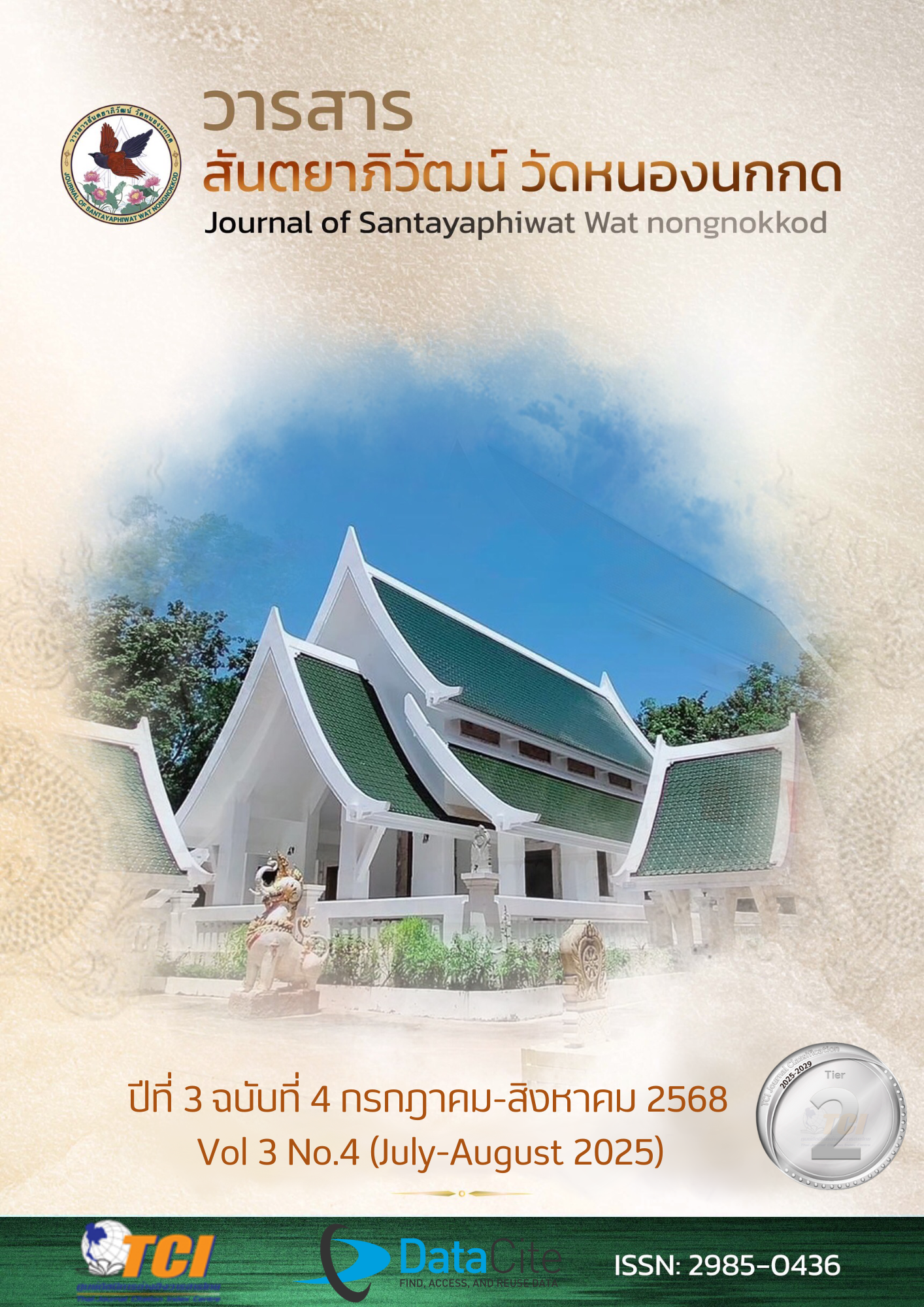INNOVATION IN DEVELOPING ADMINISTRATIVE SKILLS OF SCHOOL ADMINISTRATORS IN THE ARTIFICIAL INTELLIGENCE ERA IN EXTENDED OPPORTUNITY SCHOOLS, PRIMARY EDUCATIONAL SERVICE AREA OFFICE, CHIANG RAI AREA 4
Keywords:
นวัตกรรม, ,กการพัฒนาทักษะการบริหารงาน,, ปัญญาประดิษฐ์Abstract
This research employed a mixed-methods approach, combining both quantitative and qualitative methodologies. The objectives were to: (1) study the current conditions of administrative skills, (2) identify key factors influencing administrative practices, (3) explore the desired future state of administrative skills, and (4) propose an innovation for developing the administrative skills of school administrators in the era of artificial intelligence. The research sample included 127 administrators and teachers from extended opportunity schools under the Chiang Rai Primary Educational Service Area Office 4. In addition, six individuals were interviewed, and nine participants engaged in focus group discussions. The research instruments comprised a questionnaire on the current state of administrative skills, an interview form on influential factors affecting the development of administrative skills, and a focus group discussion record aimed at defining the desirable future and proposing innovations for administrative skill development in the AI era.
The findings revealed that: (1) the overall level of current administrative skills among school administrators was high, particularly in leadership, strategic planning, and the application of technology in management; (2) key factors influencing administrative skill development included internal factors such as knowledge, attitudes, and experience of administrators, and external factors such as educational policy, technological resources, and community support; (3) the desired future state of administrative skills emphasized the ability of administrators to integrate artificial intelligence for decision-making, data analysis, and the creation of flexible and modern learning environments; and (4) the proposed innovation should be a learning system or digital platform that holistically supports the development of administrators’ skills, enhancing their organizational management capabilities effectively in the digital era.
References
ธนากร ลิ้มสันติวงศ์. (2562). การวิเคราะห์ปัจจัยที่มีผลต่อการตัดสินใจเลือกโรงเรียนของผู้
ปกครอง. ใน วิทยานิพนธ์. มหาวิทยาลัยหอการค้าไทย.
ธัญญภัสร์ วีรลักษมีภรณ. (2567). การพัฒนาผู้บริหารสถานศึกษาในยุคดิจิทัล. วารสารมณีเชษฐาราม วัดจอมมณี, 7(5), 1-10.
พัชรินทร์ ถาปันแก้ว.(2567).ทักษะการสื่อสารของผู้บริหารที่ส่งผลต่อการปฏิบัติตามมาตรฐาน
การปฏิบัติงานของครู สังกัดสำนักงานเขตพื้นที่การศึกษาประถมศึกษาสกลนคร
เขต 1. วารสารการบริหารการศึกษาและภาวะผู้นำ มหาวิทยาลัยราชภัฏสกลนคร
แพรวดาว สนองผัน. (2557). ทักษะของผู้บริหารสถานศึกษาในศตวรรษที่ 21 สังกัดสำนักงาน
เขตพื้นที่การศึกษาประถมศึกษาอุดรธานีเขต 3. วารสารศึกษาศาสตร์ มหาวิทยาลัย
ขอนแก่น, 37(4), 42-43.
วรพล คงธรรม. (2564). การจัดการทรัพยากรมนุษย์ในยุค AI. วารสารการจัดการทรัพยากร
มนุษย์, 33-39.
อุราเพ็ญ ยิ้มประเสริฐ. (2567). ผู้บริหารสถานศึกษาไทยกับความท้าทายในยุคเทคโนโลยีพลิก
ผัน. Leadership Educational Administration Development Journal
Ramkhamhaeng University,1(2), 1-12.
อัจฉรา จุ้ยเจริญ. (2558). การพัฒนาทักษะการเรียนรู้ในศตวรรษที่ 21. กรุงเทพฯ: สำนักพิมพ์
จุฬาลงกรณ์มหาวิทยาลัย.
Brynjolfsson, E., & McAfee, A. (2014). The Second Machine Age: Work, Progress,
and Prosperity in a Time of Brilliant Technologies. W. W. Norton &
Company.
Fullan, M. (2014). The Principal: Three Keys to Maximizing Impact. San Francisco: Jossey-Bass.
OECD. (2020). The Future of Education and Skills: Education 2030. OECD Publishing.
Schwab, K. (2016). The Fourth Industrial Revolution. World Economic Forum.
UNESCO. (2015). Education for Sustainable Development: A Roadmap. UNESCO.









